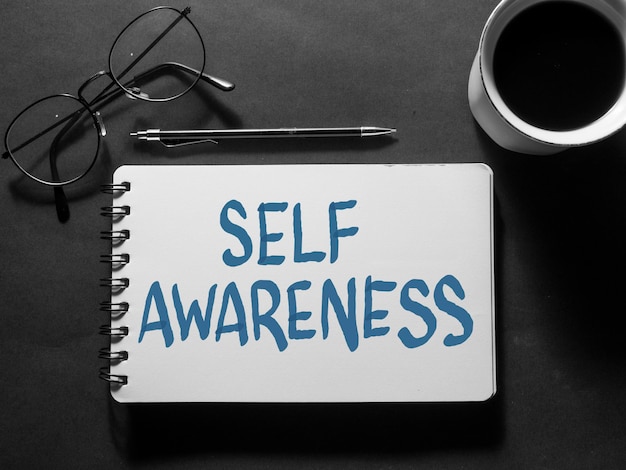Self-awareness :
Self-awareness is the ability to recognize and understand your thoughts, emotions, and behaviors. It involves being conscious of your
internal states and how they influence your actions and decisions
Even though it may not be fully possible to be impartial or unbiased about oneself, there are levels of being conscious of oneself. Exists a brief, emphasizing the series
Although we all have a general idea of what self-awareness is where it comes from, what its originals are, and what some people seem to possess in different qualities.
How to develop self-awareness
Practice Mindfulness:
Practicing mindfulness is a powerful way to develop self-awareness. By focusing on the present moment and observing your thoughts, emotions, and bodily sensations without judgment, you begin to notice patterns in your reactions and behaviors. This heightened awareness allows you to understand why you feel or act a certain way in different situations. Over time, mindfulness helps you become more attuned to your inner experiences, enabling you to make conscious choices rather than reacting automatically. This deeper understanding of yourself is the essence of self-awareness, which can lead to improved emotional regulation and better decision-making. Reflect on Your Experiences:
Reflect on your experience:
Reflecting on your experiences is a key practice in developing self-awareness. By taking time to review your daily activities, thoughts, and emotions, you gain insight into your behaviors and the reasons behind them. This reflection helps you identify patterns, such as recurring triggers or emotional responses and allows you to understand how your actions align with your values and goals. Writing in a journal or simply thinking through your day can help you see where you acted out of habit or reacted emotionally rather than thoughtfully. Over time, this practice enhances self-awareness, enabling you to make more conscious and intentional decisions
Seeking Feedback:
Seeking feedback from others is an important strategy for enhancing self-awareness. Often, we have blind spots or biases that prevent us from seeing ourselves. By asking trusted friends, family, or colleagues for honest and constructive feedback, you can gain valuable insights into how your actions and behaviors are perceived by others. This external perspective can reveal areas for improvement that you might not have noticed on your own. Listening to and reflecting on this feedback helps you understand yourself better, recognize patterns in your behavior, and ultimately make more informed choices, all of which contribute to greater self-awareness.
Understand your values and beliefs:
Understanding your values and beliefs is fundamental to developing self-awareness. Your values are the principles and standards that guide your decisions and actions, while your beliefs are the convictions you hold about yourself, others, and the world. By exploring and clarifying what is truly important to you, you gain a clearer sense of your identity and purpose. Reflect on what motivates you, what you stand for, and what you want to achieve in life. This self-exploration helps you align your behavior with your core principles, leading to more authentic and fulfilling experiences .
Observing your triggers:
Observing your triggers is a crucial practice for developing self-awareness. Triggers are situations, people, or events that provoke strong emotional reactions or stress. By paying attention to what specifically sets off these reactions, you can gain insight into underlying issues or unresolved feelings. For example, if you notice that certain comments or scenarios consistently upset you, this can reveal deeper emotional wounds or areas where you might need growth. By identifying and understanding these triggers, you can develop strategies to manage your responses more effectively, improve your emotional regulation, and ultimately foster a more balanced and self-aware mindset.
Benefits of self-awareness:
Self-awareness brings a wealth of benefits that can significantly enhance various aspects of your life. One of the most notable advantages is improved emotional regulation. When you understand your emotions and the triggers behind them, you’re better equipped to manage your feelings effectively. For instance, if you recognize that certain situations make you anxious, you can implement strategies to handle those scenarios more calmly, leading to a more balanced emotional state.Another key benefit of self-awareness is better decision-making. By gaining insight into your values, goals, and emotional responses, you can make choices that align more closely with your true self. This alignment ensures that your decisions are guided by your authentic aspirations rather than external pressures, ultimately leading to a more fulfilling and coherent life path.
Self-awareness also plays a crucial role in enhancing relationships. Understanding your own emotions and behaviors allows for more effective communication and empathy towards others. For example, if you’re aware of your emotional triggers, you can approach conflcts with a greater degree of sensitivity, fostering healthier and more constructive interactions with those around you.
conclusion:
Self-awareness is the ability to recognize and understand your own emotions, thoughts, and behaviors. To develop self-awareness, practice mindfulness, reflect on your experiences, seek feedback from others, and engage in introspective activities like journaling. The benefits of self-awareness include improved emotional regulation, better decision-making, enhanced relationships, and personal growth.




